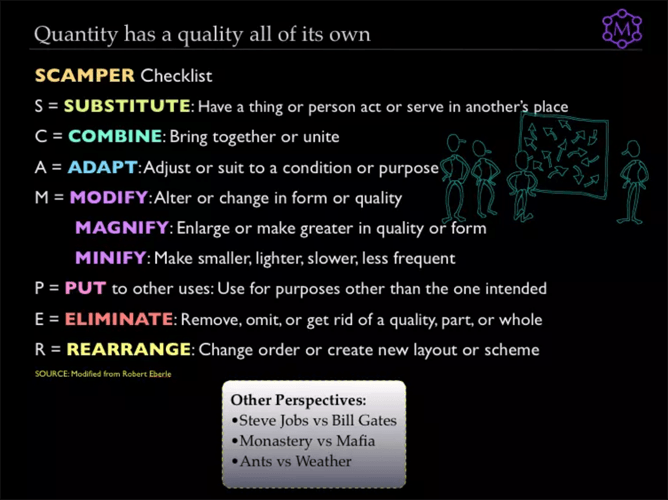SCAMPER provides a ‘hip-pocket’ tool; i.e., an unplanned method of developing appropriate questions on an impromptu basis.
With SCAMPER, you may also take raw input (i.e., first-cut ideation lists) and challenge participants to calibrate their raw input into something closer to the form of the answer being sought. Use the questions prompted by SCAMPER to stimulate more ideas quickly. For example, “How might we combine ‘A’ and ‘B’?”
“The intellect has little to do on the road to discovery. There comes a leap in consciousness, call it intuition or what you will, and the solution comes to you and you don’t know how or why.” — Albert Einstein
SCAMPER Method
Select appropriate questions offered through the mnemonic known as SCAMPER and challenge some of the raw data or initial input to help the group build and understand additional options.
SCAMPER — Similar Perspectives
In addition to SCAMPER, consider changing perspective to capture new ideas. For example, assign analogies of famous people, organizations, or entropic situations. Ask—“What would (insert blank from below) do in this scenario?” Or, compare and contrast results through break-out groups, such as:
- Steve Jobs and Apple versus Bill Gates and Microsoft
- A monastery versus the mafia (organized crime)
- A university versus the military
- An ant kingdom versus the weather system (ecosystem), etc.
Nobody is smarter than everybody because groups create more options than individual ideas that are aggregated. SCAMPER or changing perspectives makes it easier to create new ideas during the meeting that did not exist prior to the meeting. Any group or individual is known to make higher quality decision when provided with more options.
______
Don’t ruin your career by hosting bad meetings. Sign up for a workshop or send this to someone who should. MGRUSH workshops focus on meeting design and practice. Each person practices tools, methods, and activities every day during the week. Therefore, while some call this immersion, we call it the road to building high-value facilitation skills.
Our workshops also provide a superb way to earn up to 40 SEUs from the Scrum Alliance, 40 CDUs from IIBA, 40 Continuous Learning Points (CLPs) based on Federal Acquisition Certification Continuous Professional Learning Requirements using Training and Education activities, 40 Professional Development Units (PDUs) from SAVE International, as well as 4.0 CEUs for other professions. (See workshop and Reference Manual descriptions for details.)
Want a free 10-minute break timer? Sign up for our once-monthly newsletter HERE and receive a timer along with four other of our favorite facilitation tools, free.

Terrence Metz, president of MG RUSH Facilitation Training, was just 22-years-old and working as a Sales Engineer at Honeywell when he recognized a widespread problem—most meetings were ineffective and poorly led, wasting both time and company resources. However, he also observed meetings that worked. What set them apart? A well-prepared leader who structured the session to ensure participants contributed meaningfully and achieved clear outcomes.
Throughout his career, Metz, who earned an MBA from Kellogg (Northwestern University) experienced and also trained in various facilitation techniques. In 2004, he purchased MG RUSH where he shifted his focus toward improving established meeting designs and building a curriculum that would teach others how to lead, facilitate, and structure meetings that drive results. His expertise in training world-class facilitators led to the 2020 publication of Meetings That Get Results: A Guide to Building Better Meetings, a comprehensive resource on effectively building consensus.
Grounded in the principle that “nobody is smarter than everybody,” the book details the why, what, and how of building consensus when making decisions, planning, and solving problems. Along with a Participant’s Guide and supplemental workshops, it supports learning from foundational awareness to professional certification.
Metz’s first book, Change or Die: A Business Process Improvement Manual, tackled the challenges of process optimization. His upcoming book, Catalyst: Facilitating Innovation, focuses on meetings and workshops that don’t simply end when time runs out but conclude with actionable next steps and clear assignments—ensuring progress beyond discussions and ideas.




